
On 15.04.2015, European Parliament held a plenary session dedicated to a “debate to mark 100th anniversary of Armenian genocide”. In that session, a resolution titled European Parliament Resolution on the Armenian Genocide 100th Anniversary[1] was adopted, with 351 to 269 votes. 22 MP’s abstained from casting a vote. The plenary session was broadcasted live on EuroParlTV[2].
The resolution of the European Parliament established the seven following points:
European Parliament,
1) Recognizes “the tragic events that took place in 1915-1917 against the Armenians in the territory of the Ottoman Empire” as “genocide as defined in the Convention on the Prevention and Punishment of the Crime of Genocide of 1948” and pays tribute to the “the memory of the one-and-a-half million innocent Armenian victims”.
2) “Condemns all occurrences of crimes against humanity and genocide”, “pays tribute to the memory of innocent victims of all genocides”, stresses the imperative to prevent and punish genocides
3) “Strongly deplores any attempts of their denial.”
4) “Proposes that an International Remembrance Day for Genocides be established.”
5) Acknowledges affirmative steps of Turkey for its steps towards “recognising atrocities against the Ottoman Armenians” and encourages Turkey to continue in that direction by
- Opening of the archives
- Coming to terms with its past
- Recognizing the Armenian genocide
These steps would be “the way for a genuine reconciliation between Turkish and Armenian peoples”.
6) Invites Turkey to take steps for the preservation of the Armenian cultural heritage.
7) Invites Armenia and Turkey take steps for reconciliation, particularly by utilizing and supporting
- Civil society initiatives between Turkey and Armenia.
- ratification and implementation of the 2009 Zurich Protocols without preconditions
- Normalization of relations between Turkey and Armenia without preconditions.
- Opening the border
- “Cross-border cooperation and economic integration”
As the eight point,
Commends the message delivered by His Holiness Pope Francis honouring the centenary of the Armenian genocide on 12 April 2015 in a spirit of peace and reconciliation;[3]
The Resolution articulates “the Armenian Genocide perpetrated in the Ottoman Empire” with words of certainty. In other words, it establishes the ‘Armenian genocide’ as a fact. The Resolution leans on the “increasing number of [EU] Member States and national parliaments” that recognize the ‘Armenian genocide’ in order to substantiate its recognition. It underlines the “importance of keeping alive the memories of the past is paramount” and “truth and remembrance” as the requisite of Armenia-Turkey reconciliation. The Resolution protests the ‘denial of the Armenian genocide’. The resolution of the European Parliament acknowledges the reconciliatory steps taken by Turkish President and Prime Minister and encourages such positive steps.
One of the salient aspects of the Resolution is its wording. The Resolution uses the expression of “Armenian genocide perpetrated in the Ottoman Empire”. Instead of Turkey, Ottoman-Turkey or any other expression that might imply an association between ‘Armenian genocide’ and the present-day Turkey, the Resolution mentions the Ottoman Empire. In other words, with this wording, European Parliament dissociates the ‘Armenian genocide’ and the present-day Republic of Turkey. By framing the matter as such, the Resolution minimizes the implication of the alleged legal responsibility of Turkish Republic for the ‘Armenian genocide’.
Within this framework, Article 2 of the Resolution states:
Recalls its resolution of 18 June 1987 in which inter alia it recognised that the tragic events that took place in 1915-1917 against the Armenians in the territory of the Ottoman Empire represent a genocide as defined in the Convention on the Prevention and Punishment of the Crime of Genocide of 1948; condemns all occurrences of crimes against humanity and genocide, and strongly deplores any attempts at their denial;
Convention on the Prevention and Punishment of the Crime of Genocide of 1948
Convention on the Prevention and Punishment of the Crime of Genocide of 1948 is the international document that defines the crime of genocide and the procedures of the legal establishment of this crime. It is a binding document for its signatories. Article 2 of the Convention provides the definition of the crime of genocide[4]. Article 3 identifies what acts are punishable[5]. Article 4 clarifies who shall be punished for the crime of genocide. Importantly, this articles mentions real persons as the perpetuators of the crime of genocide[6]. At the same time, Article 9 implies states, as well, may have responsibility[7]. Besides, Article 6 states:
Persons charged with genocide or any of the other acts enumerated in Article 3 shall be tried by a competent tribunal of the State in the territory of which the act was committed, or by such international penal tribunal as may have jurisdiction with respect to those Contracting Parties which shall have accepted its jurisdiction.
As such, Article 6 reveals explicitly, beyond any question, that, only a competent tribunal can judge whether an act is a crime of genocide; the crime of genocide can be established only by such judgement. Unless such a judgment is available, genocide claims remain only claims.
There is no judgement of any tribunal on the legal character of the 1915 events. In fact, neither Armenia nor any other state has ever applied to for legal investigation of the 1915 events. Given that reality, characterization of the 1915 events as genocide has no legal basis. It is noteworthy that the European Parliament overlooks that basic legal fact and not only declares the 1915 events as genocide, but also urges Turkey to recognize those events as genocide. As such, European Parliament not only disrespects internationally binding documents but also becomes a party to legally uncorroborated claims.
18 June 1987 Resolution on a Political Solution to the Armenian Question[8]
On 18 June 1987, the European Parliament issued a resolution titled Resolution on a Political Solution to the Armenian Question that recognized the 1915 events as genocide. In this resolution, European Parliament denoted ‘Armenian genocide’ as a “historically proven fact”. It called Turkey to acknowledge “the genocide perpetrated against the Armenians in 1915-1917” and to take necessary steps for the fair treatment of the Armenians and other Christians and the protection of the Christian cultural heritage sites. It also called Turkey to “promote the establishment of a political dialogue between Turkey and the representatives of the Armenians”, obey the “principles of international law” with respect to Cyprus issue, accept the “existence of the Kurdish question, together with the lack of true parliamentary democracy and the failure to respect individual and collective freedoms, in particular freedom of religion”. The European Parliament remarked these as “insurmountable obstacles to consideration of the possibility of Turkey's accession to the [European] Community”.
Article 2 of the 1987 Resolution stated the following:
Believes that the tragic events in 1915-1917 involving the Armenians living in the territory of the Ottoman Empire constitute genocide within the meaning of the convention on the prevention and the punishment of the crime of genocide adopted by the UN General Assembly on 9 December 1948; Recognizes, however, that the present Turkey cannot be held responsible for the tragedy experienced by the Armenians of the Ottoman Empire and stresses that neither political nor legal or material claims against present-day Turkey can be derived from the recognition of this historical event as an act of genocide (emphasis added).
Interestingly, articles 10 and 11 of the Resolution expressed concerns of the European Parliament about the Armenian communities in Iran and the USSR.
Looking back at the Order of the Court of First Instance of the European Communities[9]
After Turkey was given the status of candidate state for the European Union membership in December 1999, Euro-Arménie ASBL based in Marseille (France) and two French citizens of Armenian origin Grégoire Krikorian and Suzanne Krikorian applied to the Court of First Instance of the European Communities for “compensation for the harm caused to them by, inter alia, recognition of Turkey's status as a candidate for accession to the European Union, although that State has refused to acknowledge the genocide perpetrated in 1915 against the Armenians living in Turkey”.[10] The applicants argued that the above mentioned resolution of the European Parliament of 18 June 1987 was a “on a political solution to the Armenian question binding legal force in respect of the European Community”[11]. The applicants insisted that 18 June 1987 Resolution made Turkey’s accession to the European Union conditional on the recognition of the 1915 events as genocide. They complaint that the European Council did not honor that resolution. Applicants claimed that “as members of the Armenian community and descendants of survivors of the genocide in question, they have suffered non-material damage.”[12] They argued that the conduct of the European Council affronted their dignity because[13];
…the memory of the victims of that genocide and the concern for historical truth are an integral part of the dignity of all Armenians. Moreover, since that genocide is an integral part of the history and identity of the Armenian people, the identity of the applicants is itself irreparably affected by the conduct of the defendant institutions. Finally, calling into question the reality of the [Armenian] genocide brings about marginalisation and a feeling of inferiority within the Armenian community. Thus the attitude of the Republic of Turkey has the effect of ostracising the applicants, since they are regarded as second-rate victims. Those circumstances result in the applicants' harbouring feelings of deep injustice, which also prevents them from completing the mourning process satisfactorily.
The court judged that there was no causal relationship between European Council’s acceptance of Turkey’s candidacy to the EU membership and the allegedly harmed dignity of the Armenians. Furthermore, the court defied the afromentioned subjective claims as follows[14]:
Secondly, as regards the requirement that the applicants must have suffered actual and certain damage, the applicants clearly confined themselves in their application to relying in general terms on non-material damage caused to the Armenian community, without giving the least indication as to the nature or extent of the damage which they consider they had suffered individually. Therefore the applicants have supplied no information that would enable the Court to find that the applicants in fact suffered actual and certain damage themselves (see, to that effect, Case T-99/98 Hameico Stuttgart and Others v Council and Commission [2003] ECR II-2195, paragraphs 68 and 69).
Yet, what was important as regards to the European Parliament resolutions, the Court established the following[15]:
It suffices to point out that the 1987 resolution is a document containing declarations of a purely political nature, which may be amended by the Parliament at any time. It cannot therefore have binding legal consequences for its author nor, a fortiori, for the other defendant institutions (emphasis added).
Nature of the European Parliament Resolution on the Centenary of the Armenian Genocide issued on 15.04.2015
The Order of the Court of First Instance of the European Communities is a key document that clarifies the nature of the European Parliament Resolutions, in general, and 15 April 2015 Resolution of the European Parliament on “the centenary of the Armenian Genocide”, in specific; the European Parliament resolution of 15 April 2015 on the centenary of the Armenian Genocide is a legally non-binding, inconsequential political declaration that may be amended at any time. In other words, it is a political declaration without any legal significance and which cannot be the basis of any legal claim.
However, as a political declaration made by the European Parliament, the Resolution bears political significance and meaning. It is likely that, this resolution will have political consequences with respect to Turkey-EU and Armenia-Turkey relations.
European Parliament in its resolution underlines higher ideals of the humanity such as justice, peace and human rights, which are also European values. However, rule of law and separation of execution, legislation and jurisdiction are the main principles of the democracy that EU also champions. In that regard, it is striking that the European Parliament overlooking the clearly defined process of the establishment of the crime of genocide in the Convention on the Prevention and Punishment of the Crime of Genocide of 1948 adopted a resolution on the ‘Armenian genocide’ before it was established by a valid court as foreseen by Article 6 of the 1948 Genocide Convention.
Besides that, the adoption of the Resolution unearths several points yet to be answered. Although, for example, European Friends of Armenia, an international non-governmental organization that operates through the financial sponsorship coming from Armenia[16] and lobbies for Armenia among the European decision making bodies and civil society, claims that “the resolution has passed with an overwhelming majority, again proving the high level of European solidarity for this issue”[17], the Resolution was adopted by 351 votes of the total of 642. This means the Resolution was adopted by %54.7 of the total votes in the European Parliament. This point requires attention, at least, raises three questions. First, %54.7 does neither mean unanimity nor substantial majority. Given that, it remains doubtful whether it is legitimate and correct to make decisions on controversial historical events and disputes with a small margin, not to say, if politicians are licensed to judge about the character of such events.
Besides, the questions remain whether % 45.3 of the MPs in the European Parliament are remorseless and unethical persons, whether they are “deniers” or puppets of Turkey, or if they have not internalized ‘European values’. If one or more of these is true, the legitimacy of the entire European Parliament may be questionable. One also has to find an answer to the question that if the ‘Armenian genocide’ is such an established fact, how can % 45.3 of the MPs in the European Parliament vote against the resolution? As to this point, one has to remember that, the European Court of Human Rights in its verdict on Perinçek v. Switzerland case on 17 December 2013 stated that:
It is even doubtful that there could be a ‘general consensus’, in particular a scientific one, on events such as those that are in question here, given that historical research is by definition open to debate and discussion and hardly lends itself to definitive conclusions or objective and absolute truths.
One would expect the European Parliament to respect the judgments of the European Court of Human Rights as one of the highest jurisdictive bodies in the EU.
The plenary session was broadcasted live, as mentioned above. A number of the MPs made one minute speeches. The Turcophobic and Islamaphobic mentality of some of the MP’s, particularly of Bulgaria, Cyprus and Greece were apparent. Then, can anyone say the adoption of the resolution was because of the defense of the ‘European values’? Depending on the answer, one may ask what ‘European values’ are in reality, not in rhetoric.
Some MPs made references to the Jewish Holocaust and rhetorically asked whether it would be acceptable to not to recognize that crime. These MPs follow a correct reasoning. However, they forget that the Jewish Holocaust, unlike the case of 1915 events, was established as a crime by a competent tribunal.
Will the Resolution facilitate Armenia-Turkey Reconciliation?
The Resolution underlined the need for the Armenian-Turkish reconciliation. Although the question remains whether this desire stems from the higher humanistic ideals of Europe or its political and economic interests, a more pragmatic consideration would be to ask if the European Parliament resolution serves this purpose.
A review of Turkish social media shows that many citizens of Turkey regard the Resolution as an outrage against Turkey. If this sense of humiliation and enmity towards Turkey gets widespread in the Turkish society, initiations at the civil society level would not be possible. Moreover, this may eradicate the positive climate developed recently. Furthermore, the similar negative and strong reactions of the major political parties in Turkey, which hardly find a common ground in many matters, shall be noted as an example of the climate that the European Parliament’s resolution created. In that sense, the reported resignation of Etyen Mahcupyan, the longtime supporter of the ruling Justice and Development Party and advisor of the Turkish Prime Minister, a day after the adoption of the Resolution, who few days ago stated that he believed the 1915 events were genocide, must be noted. Lastly, the Turkish ministry of Foreign Affairs’ Press Release Regarding the Resolution by the European Parliament on the 1915 Events[18] issued on the same day of the adoption of the Resolution demonstrates the official approach of Turkey to the Resolution.
What is striking in the press release of the Turkish MFA is its strong rhetoric, which is quite uncommon. This rhetoric together with the text itself shows that Turkey undertakes the Resolution as the reflection of an “anti-Turkish” attitude that is conditioned by the “Armenian propaganda”. The Press Release states “this aspiration [of rewriting history regarding the 1915 events] resulted in a preposterous text of resolution dated 15 April 2015 which literally repeats the anti-Turkish clichés of the Armenian propaganda”. It accuses “the politicians who supported the adoption of the resolution today in the European Parliament, in their entrenched partnership with those who have nothing to do with European values and feeding on hatred, revenge and the culture of conflict” with “religious and cultural fanaticism and indifference towards others regarded as different” and “excluding different religions and cultures”. These show that Turkey regards the Resolution as the reflection of the deep-rooted Turcophobic ideas in the European thinking. This Press Release does not hesitate to utter that “selective and one-sided approach of the European Parliament with regards to the 1915 events has the potential to harm the relations between Turkey and EU and falls far behind from bringing a solution to the issue between Turkey and Armenia”.
On 17 April 2015, political parties that have seats in the Parliament, namely AKP, CHP and MHP, with the exception of the pro-Kurdish nationalist movement HDP, issued a written statement as a response to European Parliament’s resolution[19]. This written statement is also composed with a strong language. It states that the EP Resolution is “exceptionally unfortunate” and is met with “regret”. The written statement accuses the European Parliament for “unlawfully taking over the jurisdiction”, “blaming Turkey with ungrounded accusations and passing a ruthless judgement” and usurping the right of fair trial. The Written Statement also blames the European Parliament for straining international law, and abusing enmity towards Turkey for political purposes. It states “European Parliament, further deepens the crag between [Armenia and Turkey].” It must be noted that this statement was signed by three political parties in the Turkish Parliament that received 88.87% of the total votes in the latest general elections in 2011.
Given such a strong reaction of Turkey, it is very unlikely that the Resolution will facilitate the Armenia-Turkey reconciliation, if that is the real intent of the European Parliament MPs who voted for the Resolution. Yet, the reaction of Turkey may be the verification that these MPs have already achieved what they really desired under the cover of the rhetoric of ‘facing the history’ and the wish for ‘brotherly relations with Armenia and Turkey’.
[1] For the resolution text see, European Parliament resolution of 15 April 2015 on the centenary of the Armenian Genocide (2015/2590(RSP)) (P8_TA-PROV(2015)009).
[2] http://www.europarl.europa.eu/plenary/en/home.html (latest access 16.04.2015).
[3] For a commentary on Pope Francis’ message see http://www.avim.org.tr/analiz/en/COMMEMORATION-OF-THE-100TH-ANNIVERSARY-OF-THE-1915-EVENTS-AT-ST--PETER%E2%80%99S-BASILICA-/4012 (latest access 22.04.2015).
[4] In the present Convention, genocide means any of the following acts committed with intent to destroy, in whole or in part, a national, ethnical, racial or religious group, as such:
(a) Killing members of the group;
(b) Causing serious bodily or mental harm to members of the group;
(c) Deliberately inflicting on the group conditions of life calculated to bring about its physical destruction in whole or in part;
(d) Imposing measures intended to prevent births within the group;
(e) Forcibly transferring children of the group to another group.
[5] The following acts shall be punishable:
(a) Genocide;
(b) Conspiracy to commit genocide;
(c) Direct and public incitement to commit genocide;
(d) Attempt to commit genocide;
(e) Complicity in genocide.
[6] Persons committing genocide or any of the other acts enumerated in Article 3 shall be punished, whether they are constitutionally responsible rulers, public officials or private individuals.
[7] Disputes between the Contracting Parties relating to the interpretation, application or fulfilment of the present Convention, including those relating to the responsibility of a State for genocide or any of the other acts enumerated in Article 3, shall be submitted to the International Court of Justice at the request of any of the parties to the dispute.
[8] http://www.europarl.europa.eu/intcoop/euro/pcc/aag/pcc_meeting/resolutions/1987_07_20.pdf (latest access 16.04.2015).
[9] Before 2009, the Court of First Instance was the European juridical body that was to hear the cases that were opened by individuals and member states against the institutions of the European Union. After 2009, the Court of First Instance was transformed into the General Court as a constituent court of the Court of Justice of the European Union.
[10] http://curia.europa.eu/juris/document/document.jsf?docid=48869&doclang=EN (latest access 16.04.2015).
[11] Ibid.
[12] Ibid.
[13] Ibid.
[14] Ibid.
[15] Ibid.
[16] http://www.eufoa.org/en/about-eufoa (latest access 20.04.2015). European Friends of Armenia states the following as to its financial sources. However, it does not give the names of the organizations and/or private individuals that provide financial support.
EuFoA's initial sponsoring came from Armenia, but we seek to diversify our financial sources and invite interested parties based or active in Europe to support us.
With all our sponsors we have a non-interference agreement, meaning that they do not influence our day-to-day work at any time. We do not accept funds from governmental institutions and political sources.
[17] http://www.eufoa.org/newsroom/308/51/European-Parliament-commemorates-the-centennial-of-the-Armenian-Genocide/?cntnt01limit=4&cntnt01template=display_home&cntnt01options=1&cntnt01detailpage=latest-news&cntnt01orderby=item_date+DESC&cntnt01origid=15 (latest Access 20.04.2015).
[18] http://www.mfa.gov.tr/no_-117_-15-april-2015_-press-release-regarding-the-press-release-regarding-the-resolution-by-the-european-parliament-on-the-1915-events.en.mfa (latest access 16.04.2015).
[19] http://t24.com.tr/haber/akp-chp-ve-mhpden-apye-karsi-birlesti,293777 (latest Access 21.04.2015).
© 2009-2025 Center for Eurasian Studies (AVİM) All Rights Reserved
No comments yet.
-
 THE JUDGEMENT OF THE EUROPEAN COURT OF HUMAN RIGHTS GRAND CHAMBER ON PERİNÇEK v. SWITZERLAND CASE in PERSPECTIVE - 2: THREE DISQUALIFIED ARGUMENTS AND “THE PREVENTION OF DISORDER”
THE JUDGEMENT OF THE EUROPEAN COURT OF HUMAN RIGHTS GRAND CHAMBER ON PERİNÇEK v. SWITZERLAND CASE in PERSPECTIVE - 2: THREE DISQUALIFIED ARGUMENTS AND “THE PREVENTION OF DISORDER”
Turgut Kerem TUNCEL 23.10.2015 -
 THE BACKTRACK OF AUSTRIA AND LUXEMBURG ON THE CHARACTERIZATION OF THE 1915 EVENTS AS GENOCIDE
THE BACKTRACK OF AUSTRIA AND LUXEMBURG ON THE CHARACTERIZATION OF THE 1915 EVENTS AS GENOCIDE
Turgut Kerem TUNCEL 21.10.2015 -
 THE KARABAKH CONFLICT AND THE LAWFARE OF ARMENIA: ARMENIA’S CAMPAIGN FOR REMEDIAL SECESSION (I)
THE KARABAKH CONFLICT AND THE LAWFARE OF ARMENIA: ARMENIA’S CAMPAIGN FOR REMEDIAL SECESSION (I)
Turgut Kerem TUNCEL 27.10.2020 -
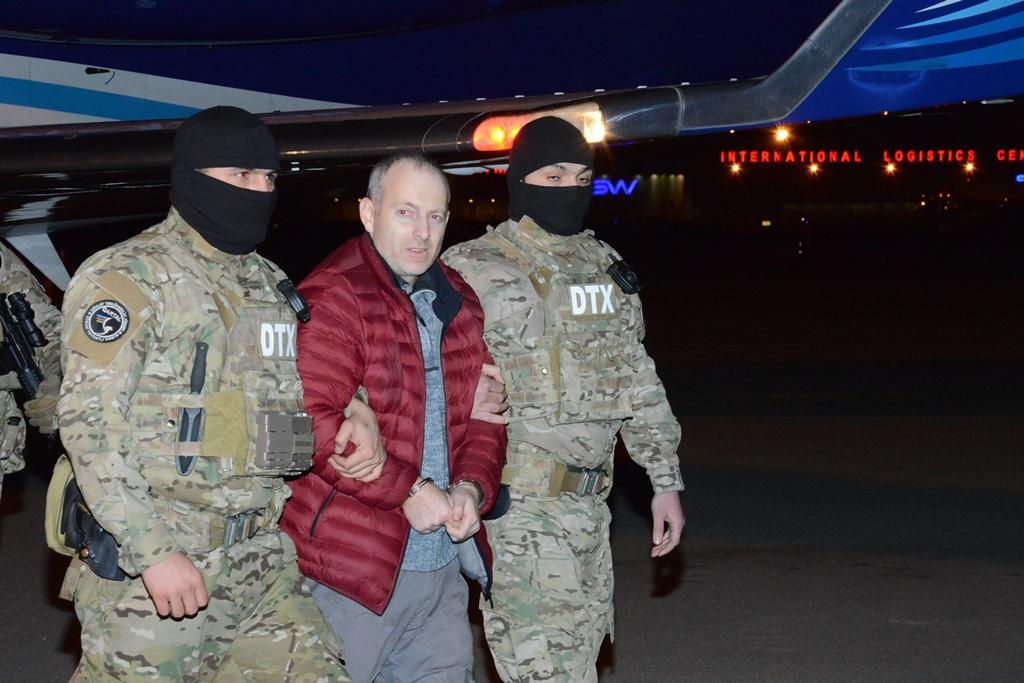 ALEXANDER LAPSHIN’S EXTRADITION TO AZERBAIJAN: A NEW EPISODE IN KARABAKH DISPUTE
ALEXANDER LAPSHIN’S EXTRADITION TO AZERBAIJAN: A NEW EPISODE IN KARABAKH DISPUTE
Turgut Kerem TUNCEL 21.02.2017 -
 THE GRAIN INITIATIVE AND THE BLACK SEA SECURITY - II
THE GRAIN INITIATIVE AND THE BLACK SEA SECURITY - II
Turgut Kerem TUNCEL 03.08.2023
-
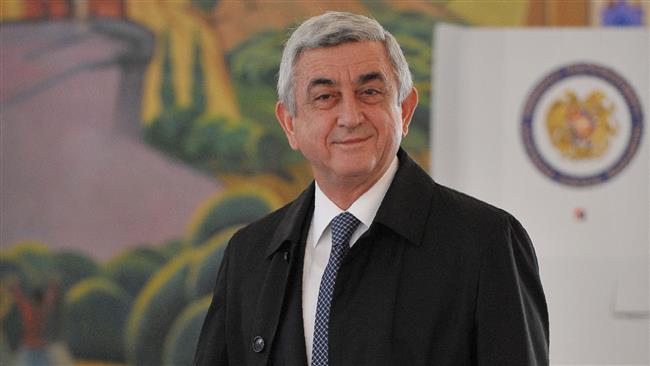 2 APRIL 2017 PARLIAMENTARY ELECTIONS IN ARMENIA
2 APRIL 2017 PARLIAMENTARY ELECTIONS IN ARMENIA
Turgut Kerem TUNCEL 14.04.2017 -
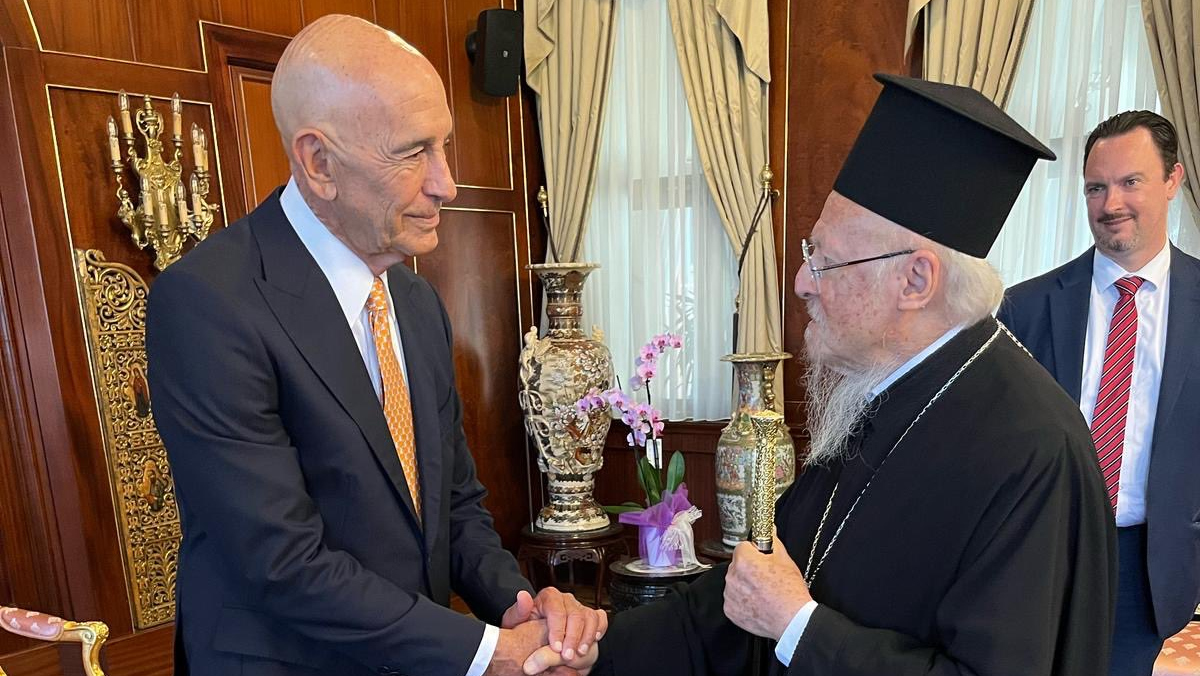 THE HARMFUL EFFECTS OF THE POLITICIZATION OF THE FENER GREEK PATRIARCHATE
THE HARMFUL EFFECTS OF THE POLITICIZATION OF THE FENER GREEK PATRIARCHATE
Mehmet Oğuzhan TULUN 03.09.2025 -
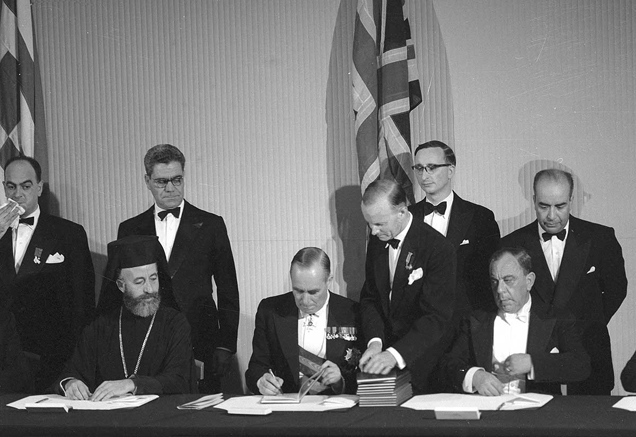 60TH ANNIVERSARY OF THE DEFUNCT “REPUBLIC OF CYPRUS”
60TH ANNIVERSARY OF THE DEFUNCT “REPUBLIC OF CYPRUS”
Teoman Ertuğrul TULUN 01.10.2020 -
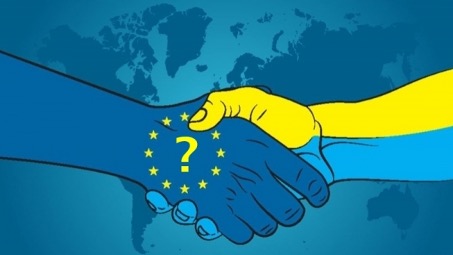 IS THERE DISCRIMINATION BETWEEN REFUGEES IN THE UKRAINE TRAGEDY?
IS THERE DISCRIMINATION BETWEEN REFUGEES IN THE UKRAINE TRAGEDY?
Hazel ÇAĞAN ELBİR 24.03.2022 -
 SOME CRITICISMS REGARDING PROF. DR. ERIK-JAN ZÜRCHER’S CENTENNIAL STATEMENT
SOME CRITICISMS REGARDING PROF. DR. ERIK-JAN ZÜRCHER’S CENTENNIAL STATEMENT
Mehmet Oğuzhan TULUN 21.04.2015
-
25.01.2016
THE ARMENIAN QUESTION - BASIC KNOWLEDGE AND DOCUMENTATION -
12.06.2024
THE TRUTH WILL OUT -
27.03.2023
RADİKAL ERMENİ UNSURLARCA GERÇEKLEŞTİRİLEN MEZALİMLER VE VANDALİZM -
17.03.2023
PATRIOTISM PERVERTED -
23.02.2023
MEN ARE LIKE THAT -
03.02.2023
BAKÜ-TİFLİS-CEYHAN BORU HATTININ YAŞANAN TARİHİ -
16.12.2022
INTERNATIONAL SCHOLARS ON THE EVENTS OF 1915 -
07.12.2022
FAKE PHOTOS AND THE ARMENIAN PROPAGANDA -
07.12.2022
ERMENİ PROPAGANDASI VE SAHTE RESİMLER -
01.01.2022
A Letter From Japan - Strategically Mum: The Silence of the Armenians -
01.01.2022
Japonya'dan Bir Mektup - Stratejik Suskunluk: Ermenilerin Sessizliği -
03.06.2020
Anastas Mikoyan: Confessions of an Armenian Bolshevik -
08.04.2020
Sovyet Sonrası Ukrayna’da Devlet, Toplum ve Siyaset - Değişen Dinamikler, Dönüşen Kimlikler -
12.06.2018
Ermeni Sorunuyla İlgili İngiliz Belgeleri (1912-1923) - British Documents on Armenian Question (1912-1923) -
02.12.2016
Turkish-Russian Academics: A Historical Study on the Caucasus -
01.07.2016
Gürcistan'daki Müslüman Topluluklar: Azınlık Hakları, Kimlik, Siyaset -
10.03.2016
Armenian Diaspora: Diaspora, State and the Imagination of the Republic of Armenia -
24.01.2016
ERMENİ SORUNU - TEMEL BİLGİ VE BELGELER (2. BASKI)
-
AVİM Conference Hall 24.01.2023
CONFERENCE TITLED “HUNGARY’S PERSPECTIVES ON THE TURKIC WORLD"









